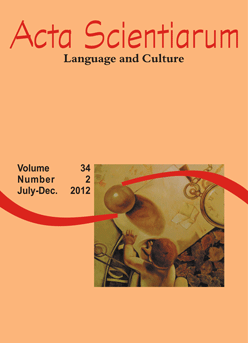<b>The textuality of <i>O Macaco Brasileiro</i> in the foundation of the brazilian journalistic discourse (1821-1822)</b> - doi: 10.4025/actascilangcult.v34i2.17874
Abstract
This article is a part of my doctorate research, which aimed at understanding the foundation and the operation of the journalistic discourse in Brazil and the meaning of nation, freedom and independence during the years 1821 and 1822. This research is theoretically based on the Discourse Analysis (Pêcheux, 1969, 1975; Orlandi, 1996, 1999) producing interpretation moves that will make it possible to understand part of the functioning of an epoch, as well as of a social practice that produces founding principles. We realize that it was not the arrival of the Portuguese Court to Brazil that produced a Brazilian journalistic discourse, but the presence of a Brazilian press. It was from 1821, with the bill that abolished the previous censorship, that there was a displacement from the journalism determined by the Court to another discursivity. This happens in the textuality of O Macaco Brasileiro. As it installs a new discursivity, it materializes a new Brazilian journalist subject position which corresponds to the foundation of the Brazilian journalistic discourse.
Downloads
DECLARATION OF ORIGINALITY AND COPYRIGHTS
I Declare that current article is original and has not been submitted for publication, in part or in whole, to any other national or international journal.
The copyrights belong exclusively to the authors. Published content is licensed under Creative Commons Attribution 4.0 (CC BY 4.0) guidelines, which allows sharing (copy and distribution of the material in any medium or format) and adaptation (remix, transform, and build upon the material) for any purpose, even commercially, under the terms of attribution.
Read this link for further information on how to use CC BY 4.0 properly.




















6.png)









